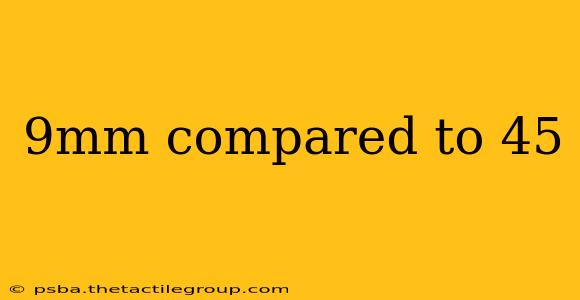Choosing the right caliber for self-defense or sport shooting can be a daunting task, especially when comparing popular choices like the 9mm and the .45 ACP. Both cartridges have a long and storied history, boasting dedicated fans on both sides of the debate. This in-depth comparison will delve into the key differences between the 9mm and .45 ACP, helping you make an informed decision based on your specific needs and preferences.
Key Differences: Ballistics and Recoil
The most significant difference lies in their ballistics and resulting recoil.
9mm Parabellum (9x19mm)
- Caliber: 9mm
- Size: Smaller and lighter cartridge
- Velocity: Generally higher velocity than .45 ACP, resulting in flatter trajectory.
- Recoil: Significantly less recoil than .45 ACP, allowing for faster follow-up shots.
- Capacity: Higher magazine capacity in most handguns.
.45 ACP (11.43x23mm)
- Caliber: .45 inch
- Size: Larger and heavier cartridge
- Velocity: Lower velocity compared to 9mm.
- Recoil: Substantial recoil, potentially affecting accuracy and follow-up shots, especially for less experienced shooters.
- Capacity: Lower magazine capacity compared to 9mm handguns.
Stopping Power: The Myth of the "Bigger is Better" Approach
The long-standing debate centers around stopping power. While the .45 ACP boasts a larger diameter bullet and therefore a larger wound cavity, the reality is more nuanced than simply "bigger is better." Modern 9mm ammunition, with advancements in bullet design (like hollow points and jacketed hollow points), has dramatically improved its stopping power. The higher velocity of 9mm rounds also contributes to deeper penetration, potentially leading to more effective incapacitation.
Factors Influencing Stopping Power:
- Bullet design: Hollow-point bullets expand upon impact, causing more tissue damage.
- Shot placement: Accurate shot placement is paramount regardless of caliber. A well-placed 9mm shot will be far more effective than a poorly placed .45 ACP shot.
- Velocity: Higher velocity contributes to deeper penetration and greater energy transfer.
Practical Considerations: Recoil Management and Capacity
Recoil management plays a crucial role in accuracy and follow-up shots, particularly in stressful situations. The significantly lower recoil of the 9mm allows for faster target acquisition and more rapid firing, potentially giving the shooter a decisive advantage in a self-defense scenario.
The higher magazine capacity of most 9mm handguns provides more rounds available before reloading, offering a critical advantage in extended engagements.
Cost and Availability
Generally, 9mm ammunition is more readily available and significantly less expensive than .45 ACP ammunition. This is a considerable factor for those who practice regularly or require large quantities of ammunition.
Which Caliber is Right for You?
The "best" caliber ultimately depends on individual needs and preferences.
Choose 9mm if:
- You prioritize less recoil and faster follow-up shots.
- You need higher magazine capacity.
- You want lower ammunition costs.
- You value ease of handling and quicker target acquisition.
Choose .45 ACP if:
- You prioritize perceived stopping power (understanding the nuances discussed above).
- You are comfortable managing substantial recoil.
- You prefer a heavier handgun.
This comparison provides a balanced overview of both cartridges. Ultimately, the best way to determine your preference is to handle and shoot both calibers if possible. Consult with experienced shooters and firearms instructors to gain further insights and make an informed decision tailored to your individual circumstances.

